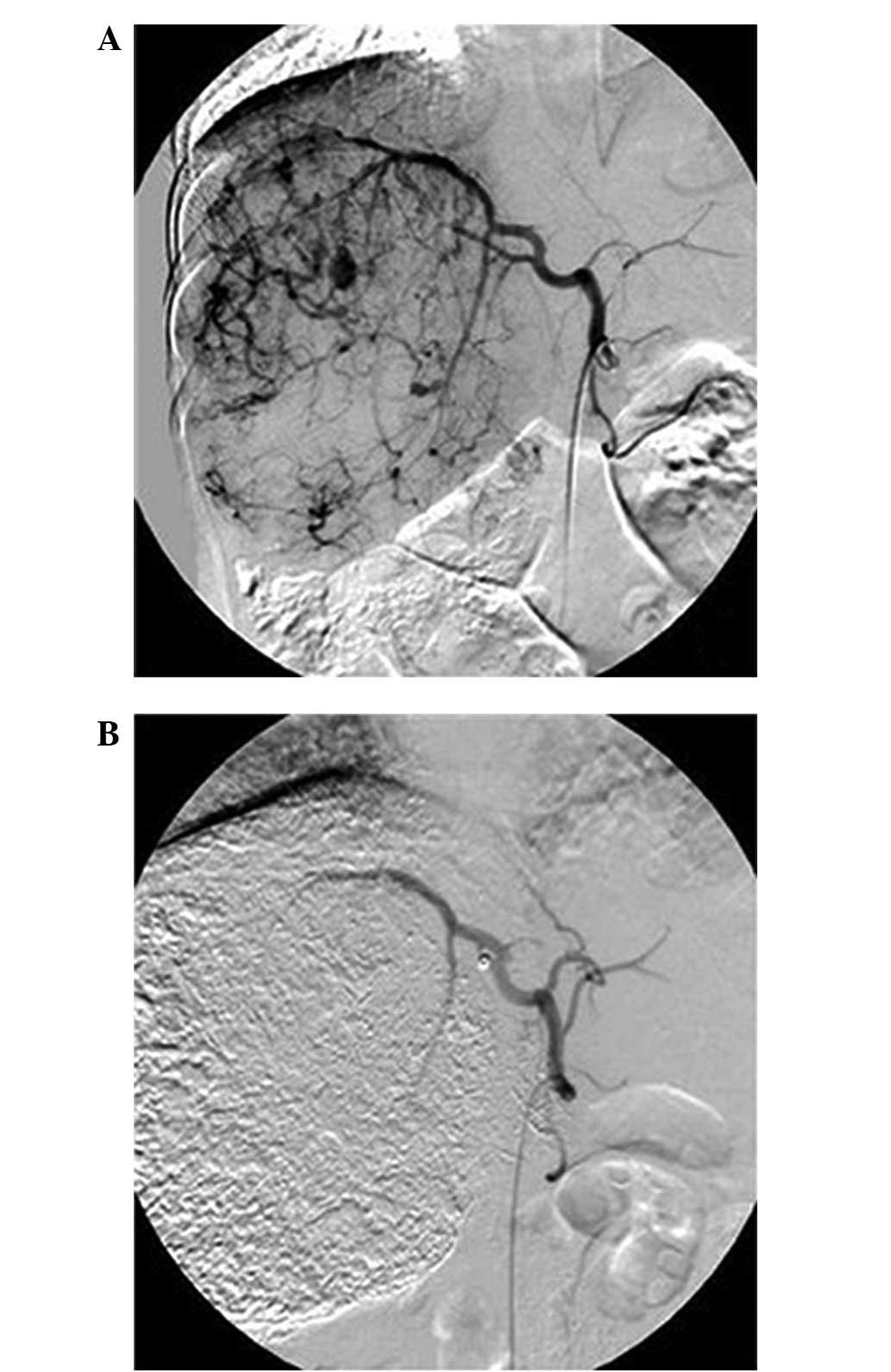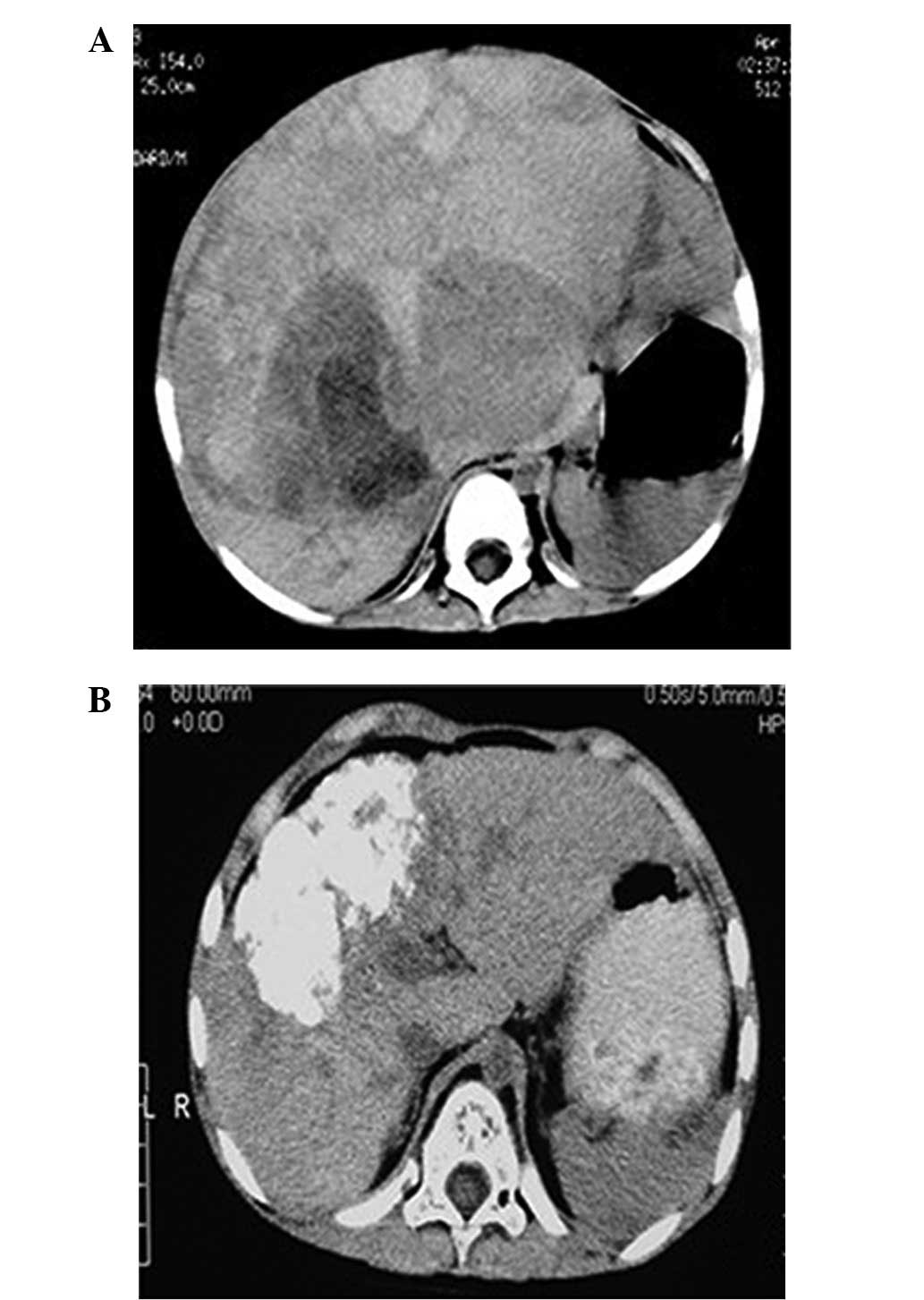|
1
|
Schnater JM, Kohler SE, Lamers WH, et al:
Where do we stand with hepatoblastoma? A review. Cancer.
98:668–678. 2003. View Article : Google Scholar : PubMed/NCBI
|
|
2
|
Derek J and Perilongo G: Hepatoblastoma:
an oncological review. Pediatr Radiol. 36:183–186. 2006. View Article : Google Scholar : PubMed/NCBI
|
|
3
|
Czauderna P, Otte JB, Roebuck DJ, et al:
Surgical treatment of hepatoblastoma in children. Pediatr Radiol.
36:187–191. 2006. View Article : Google Scholar
|
|
4
|
Nakagawa N, Cornelius AS, Kao SCS, et al:
Transcatheter oily chemoembolization for unresectable malignant
liver tumors in children. J Vasc Intervent Radiol. 4:353–358. 1993.
View Article : Google Scholar : PubMed/NCBI
|
|
5
|
Arcement CM, Towbin RB, Meza MP, et al:
Intrahepatic chemoembolization in unresectable pediatric liver
malignancies. Pediatr Radiol. 30:779–785. 2000. View Article : Google Scholar : PubMed/NCBI
|
|
6
|
Oue T, Fukuzawa M, Kusafuka T, et al:
Transcatheter arterial chemoembolization in the treatment of
hepatoblastoma. J Pediatr Surg. 33:1771–1775. 1998. View Article : Google Scholar : PubMed/NCBI
|
|
7
|
Tashjian DB, Moriarty KP, Courtney RA, et
al: Preoperative chemoembolization for unresectable hepatoblastoma.
Pediatr Surg Int. 18:187–189. 2002. View Article : Google Scholar : PubMed/NCBI
|
|
8
|
Exelby PR, Filler RM and Grosfeld JL:
Liver tumors in children in the particular reference to
hepatoblastoma and hepatocellular carcinoma: American Academy of
Pediatrics surgical section survey - 1974. J Pediatr Surg.
10:329–337. 1975. View Article : Google Scholar : PubMed/NCBI
|
|
9
|
Evans AE, Land VJ, Newton WA, et al:
Combination chemotherapy (vincristine, adriamycin,
cyclophosphamide, and 5-fluorouracil) in the treatment of children
with malignant hepatoma. Cancer. 50:821–826. 1982. View Article : Google Scholar : PubMed/NCBI
|
|
10
|
Vogl TJ, Scheller A, Jakob U, et al:
Transarterial chemoembolization in the treatment of hepatoblastoma
in children. Eur Radiol. 16:1393–1396. 2006. View Article : Google Scholar : PubMed/NCBI
|
|
11
|
Ohtsuka Y, Matsunaga T, Yoshida H, et al:
Optimal strategy of preoperative transcatheter arterial
chemoembolization for hepatoblastoma. Surg Today. 34:127–133. 2004.
View Article : Google Scholar : PubMed/NCBI
|
|
12
|
Li JP, Chu JP, Yang JY, et al:
Preoperative transcatheter selective arterial chemoembolization in
treatment of unresectable hepatoblastoma in infants and children.
Cardiovasc Intervent Radiol. 31:1117–1123. 2008. View Article : Google Scholar : PubMed/NCBI
|
|
13
|
Ortega JA, Krailo MD, Haas JE, et al:
Effective treatment of unresectable or metastatic hepatoblastoma
with cisplatin and continuous infusion doxorubicin chemotherapy: a
report from the Children’s Cancer Study Group. J Clin Oncol.
9:2167–2176. 1991.
|
|
14
|
Seo T, Ando H, Watanabe Y, et al:
Treatment of hepatoblastoma: less extensive hepatectomy after
effective preoperative chemotherapy with cisplatin and adriamycin.
Surgery. 123:407–414. 1998. View Article : Google Scholar : PubMed/NCBI
|
|
15
|
Ehrlich PF, Greenberg ML and Filler RM:
Improved long-term survival with preoperative chemotherapy for
hepatoblastoma. J Pediatr Surg. 32:999–1003. 1997. View Article : Google Scholar : PubMed/NCBI
|
|
16
|
Ogita S, Tokiwa K, Taniguchi H and
Takahashi T: Intraarterial chemotherapy with lipid contrast medium
for hepatic malignancies in infants. Cancer. 60:2886–2890. 1987.
View Article : Google Scholar : PubMed/NCBI
|
|
17
|
Groupe d’Etude et de Traitement du
Carcinome Hépatocellulaire. A comparison of lipiodol
chemoembolization and conservative treatment for unresectable
hepatocellular carcinoma. N Engl J Med. 332:1256–1261. 1995.
View Article : Google Scholar : PubMed/NCBI
|
|
18
|
Llovet JM, Real MI, Montaña X, et al:
Arterial embolization or chemoembolisation versus symptomatic
treatment in patients with unresectable hepatocellular carcinoma: a
randomized controlled trial. Lancet. 359:1734–1739. 2002.
View Article : Google Scholar
|
|
19
|
Iwai K, Maeda H and Konno T: Use of oily
contrast medium for selective drug targeting to tumor: enhanced
therapeutic effect and X-ray image. Cancer Res. 44:2115–2121.
1984.PubMed/NCBI
|
|
20
|
Nakamura H, Hashimoto T, Oi H and Sawada
S: Transcatheter oily chemoembolization of hepatocellular
carcinoma. Radiology. 170:783–786. 1989. View Article : Google Scholar : PubMed/NCBI
|
|
21
|
Sasaki Y, Imaoka S, Kasugai H, et al: A
new approach to chemoembolization therapy for hepatoma using
ethiodized oil, cisplatin, and gelatin sponge. Cancer.
60:1194–1203. 1987. View Article : Google Scholar : PubMed/NCBI
|
|
22
|
Sakamoto I, Aso N, Nagaoki K, et al:
Complications associated with transcatheter arterial embolization
for hepatic tumors. Radiographics. 18:605–619. 1998. View Article : Google Scholar : PubMed/NCBI
|
|
23
|
Chung JW, Park JH, Im JG, et al: Pulmonary
oil embolism after transcatheter oily chemoembolization of
hepatocellular carcinoma. Radiology. 187:689–693. 1993. View Article : Google Scholar : PubMed/NCBI
|
















